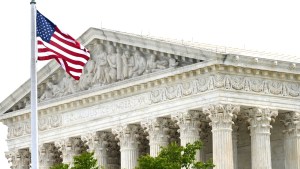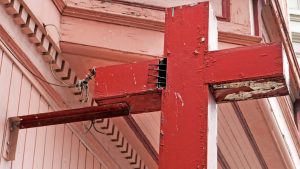Lenten Campaign 2025
This content is free of charge, as are all our articles.
Support us with a donation that is tax-deductible and enable us to continue to reach millions of readers.
Did the Supreme Court’s June 17 ruling in favor of a Catholic Philadelphia adoption agency do anything to advance the cause of religious freedom?
In spite of the fact that the decision was unanimous, many legal experts found that the ruling was a narrow one that will not have much effect beyond defending the agency’s right to operate contrary to Philadelphia’s non-discrimination statutes.
The Court ruled in Fulton v. City of Philadelphia that the city’s decision to not contract with Catholic Social Services, which is affiliated with the Roman Catholic Archdiocese of Philadelphia, for the provision of foster care services unless the agency agreed to certify same-sex couples as foster parents is a violation of its religious liberty.
The city had maintained that CSS’s refusal to certify same-sex married couples violated both a non-discrimination provision in the agency’s contract with the city as well as the non-discrimination requirements of the citywide Fair Practices Ordinance.
The Supreme Court ruling said that Philadelphia’s actions “burdened CSS’s religious exercise by forcing it either to curtail its mission or to certify same-sex couples as foster parents in violation of its religious beliefs.
“Under the circumstances here, the City does not have a compelling interest in refusing to contract with CSS,” the Court continued.
In an initial reaction, Archbishop Nelson Perez of Philadelphia called the decision “a profound one that rings loudly in Philadelphia and reverberates throughout the country.” It is a “crystal clear affirmation of First Amendment rights for the Archdiocese of Philadelphia and all charitable ministries in the United States who are inspired by their faith to serve the most vulnerable among us,” he said.
But it remains to be seen whether the ruling will be applicable to other “charitable ministries,” such as Boston Catholic Charities, which decided to stop participating in adoption services in 2006 because it foresaw that it would be compelled, under Massachusetts’s new same-sex marriage law, to place children with same-sex couples.
Thomas Olp, vice president and senior counsel of the Thomas More Society, was doubtful.
“It seems like, unfortunately, kind of a narrow ruling that satisfies the case at hand but doesn’t really deal with the real issue, which is how do you deal with the free exercise clause of the First Amendment,” Olp said in an interview.
The Thomas More Society is a Chicago-based law firm dealing with life, family and religious liberty issues.
The Smith case
Much of the Fulton ruling hinged on a 1990 Supreme Court decision, Employment Division v. Smith, which said that if a law is generally applicable and is neutral as far as religion is concerned, it can curtail religious exercise.
In Smith, the court “severely reduced the level of constitutional protection accorded religious freedom,” explained Helen Alvaré, in an article in Our Sunday Visitor. “Pre-Smith, even laws that were ‘neutral’ on their face (not targeting religion) and ‘generally applicable’ to citizens in the jurisdiction, could not burden religion unless the state could prove a ‘compelling state interest’ exercised by means ‘least restrictive’ of religion. This is the ‘strict scrutiny’ standard of review.
“After Smith, however,” Alvaré continued, “states could burden religious free exercise with a neutral, generally applicable law by showing merely that the law bore a ‘rational relationship’ to a ‘legitimate state interest.’ This is an easy constitutional standard to meet.”
The Thomas More Society’s Olp referred to Justice Samuel A. Alito’s 77-page concurrence to Chief Justice John G. Roberts’ opinion for the court in Fulton: Alito pointed out that Smith is not what the First Amendment says.
“The First Amendment says you can’t curtail people’s religious exercise, unless you have a darned good reason,” Olp said. “As Alito pointed out, all the [City of Philadelphia] has to do is eliminate exemptions, assuming it’s truly general, and then they can kind of get away with abridgment of religious exercise.”
As a result of the narrowness of the Fulton decision, cases like the one brought by Catholic Social Services are going to keep being litigated, Olp said. “I don’t see the City of Philadelphia [because of the court decision] throwing in the towel and saying, ‘Well, we were wrong, so we have to allow the Catholic Church not to evaluate approval of gay couples. … They’re going to totally take the exact position they have now, so it will keep going.”
Moving the ball
Richard Garnett, professor of law at the University of Notre Dame, did not feel the decision in Fulton was as narrow as many others did. He found that the decision contains several “doctrinal points that move the ball” in a direction more favorable to religious liberty.
“One of the realities about foster care is that governments do want to allow, in some circumstances, placements that take into account things like race,” Garnett said in an interview. “Ordinarily, in official actions, we don’t allow any racial distinctions whatsoever, but there are people who think that when it comes to foster care — I don’t have an opinion on this because I don’t know enough to have an opinion on it — but I gather that in the kind of social services space, some people say, ‘You know, all things being equal, if you can place a Latino kid with a Latino foster family, that’s a good thing, for purposes of the child’s best interest.’ So in the foster care context they are often going to allow some kinds of actions that would otherwise violate a strict nondiscrimination rule. I think what Fulton said is if you’re going to do that, you also have to allow for participants and providers to act on the basis of their religious conviction. So that’s going to be interesting to see how that plays out. Are these cities really going to say that within the foster care context you can never engage in any placement actions that are sensitive to racial questions or sexual orientation or gender or religion or what have you?”
In addition, Garnett, who directs the Notre Dame Program on Church, State & Society, pointed out that the court said in its ruling that it counts as a burden on religious exercise if the government attaches certain conditions to participating in a particular enterprise.
“I always thought that was true, but the court hadn’t always been clear on this point,” he said. “That point stays as being part of the relevant doctrine. And that’s relevant in, for example, school choice programs, which exist in half the states in this country. Imagine a state that says, ‘We’re going to have school choice and we’re going to allow religious schools to participate, but you can only participate if you give up your admissions policies that prefer parish members.’ Under the Fulton case, if a local government were to do that, it would amount to a burden on the school’s religious exercise. There would be other things that would come into play whether it was in the end permissible or not, but the fact that that’s considered a burden on religious exercise is, I think, an important development.”
For Olp, Fulton is reminiscent of a case his law firm was involved in several years ago, when the State of Illinois stopped contracting with Catholic Charities for foster care and adoption services because the agency would not place children with same-sex couples.
“We challenged that in court and lost,” he said. “I talked to one of the directors of Catholic Social Services, … and he was saying that while they’re looking at [Fulton] they don’t anticipate that the State of Illinois is going to change its mind [because of it]. They take a position that you have to toe the party line. The guy I talked to was saying it’s estimated that 7,000 foster parents were lost in Illinois because of what the state did. And to gain what? To gain a few gay foster parents who could have been approved by any one of up to 50 other agencies?”



